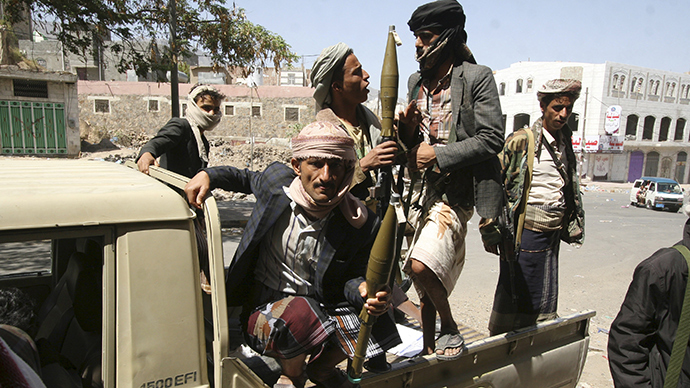Saudi’s support of tribesmen ‘dangerous, illegal and immoral escalation of Yemeni conflict’

Saudi Arabia’s alleged training of Yemeni tribesmen to fight the Houthis would only intensify the unstable situation in Yemen as Riyadh tries to advance its foreign policy objectives, says Ajamu Baraka, Human-rights activist and expert on the Middle East.
Saudi Arabia has allegedly started training hundreds of Yemeni tribesmen to fight Houthi rebels. All this is happening while there is regular shelling of the insurgents.
RT:How could the emergence of a better-trained force impact the balance of power in Yemen?
Ajamu Baraka: It can’t. This is basically a dangerous, illegal and immoral escalation of the conflict in Yemen. Instead of moving parties toward a diplomatic, political solution the Saudis have decided that they are going to intensify the unstable situation in Yemen by providing arms to an oppositional group, a group that has been traditionally opposed to the Houthis in order to continue to try to advance its particular foreign policy objectives in Yemen.
READ MORE: Saudi Arabia training tribal ground force in Yemen – report
RT:Yemeni territory is heavily fragmented along tribal lines. Could the divisions grow bigger if the tribes get more experienced in combat?
AB: Of course they could become more dangerous as they gain more military combat experience, but I don’t think that this is the main objective of the Saudis. I think the Saudis have an objective which is connected to the interests of Israel which is basically to perpetuate the narrative that the Houthis are a proxy force of Iran and that the they are a dangerous force, and Iran is a dangerous force in order to keep the connection with the US in place, and to ensure that it can remain the kind of political force that it is in the region. And so supplying the rebels becomes a proxy force for itself and objectively for Israel.
RT:Islamic State is known to swell its ranks with battle-hardened locals. Can tribesmen be radicalized easily?
AB: That’s a possibility because the rebel force that Saudis are supplying have some traditional Wahhabi Islamic leanings which we know is the main ideological Islamic foundation for al-Qaeda. So while they may not be technically part of the al-Qaeda network there is a clear theological and ideological connection. So that possibility could happen that those arms and those forces can in fact be in hands. And the only force that really is gaining as a consequence of this conflict is al-Qaeda.
RT:A myriad of gangs are wrestling for power in post-war Libya. Could Yemen be a repeat case?
AB: It very well could. That seems to be the playbook to basically fragment these nation states providing a vacuum that allows for these more radicalized forces to emerge. So the same kind of danger exists in Yemen. And it’s strange and very unclear what they are trying to do in Yemen beyond serving just as a proxy force for Israel and the US at this point. They may be connected to the kinds of shuffling we see in Saudi monarchy in the last few days.
The statements, views and opinions expressed in this column are solely those of the author and do not necessarily represent those of RT.
The statements, views and opinions expressed in this column are solely those of the author and do not necessarily represent those of RT.












